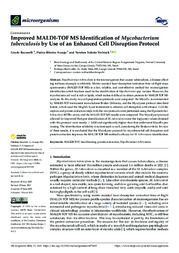Improved MALDI-TOF MS identification of Mycobacterium tuberculosis by use of an enhanced cell disruption protocol.
Improved MALDI-TOF MS identification of Mycobacterium tuberculosis by use of an enhanced cell disruption protocol.
Author(s): BACANELLI, G.; ARAUJO, F. R.; VERBISCK, N. V.
Summary: ABSTRACT - Mycobacterium tuberculosis is the microorganism that causes tuberculosis, a disease affecting millions of people worldwide. Matrix-assisted laser desorption ionization time-of-flight mass spectrometry (MALDI-TOF MS) is a fast, reliable, and cost-effective method for microorganism identification which has been used for the identification of Mycobacterium spp. isolates. However, the mycobacteria cell wall is rich in lipids, which makes it difficult to obtain proteins for MALDI-TOF MS analysis. In this study, two cell preparation protocols were compared: the MycoEx, recommended by MALDI-TOF instrument manufacturer Bruker Daltonics, and the MycoLyser protocol described herein, which used the MagNA Lyser instrument to enhance cell disruption with ethanol. Cell disruption and protein extraction steps with the two protocols were performed using the Mycobacterium tuberculosis H37Rv strain, and the MALDI-TOF MS results were compared. The MycoLyser protocol allowed for improved Biotyper identification of M. tuberculosis since the log(score) values obtained with this protocol were mostly > 1.800 and significantly higher than that underwent MycoEx processing. The identification reliability was increased as well, considering the Bruker criteria. In view of these results, it is concluded that the MycoLyser protocol for mycobacterial cell disruption and protein extraction improves the MALDI-TOF MS method's efficacy for M. tuberculosis identification.
Publication year: 2023
Types of publication: Journal article
Unit: Embrapa Beef Cattle
Observation
Some of Embrapa's publications are published as ePub files. To read them, use or download one of the following free software options to your computer or mobile device. Android: Google Play Books; IOS: iBooks; Windows and Linux: Calibre.
Access other publications
Access the Agricultural Research Database (BDPA) to consult Embrapa's full library collection and records.
Visit Embrapa Bookstore to purchase books and other publications sold by Embrapa.

